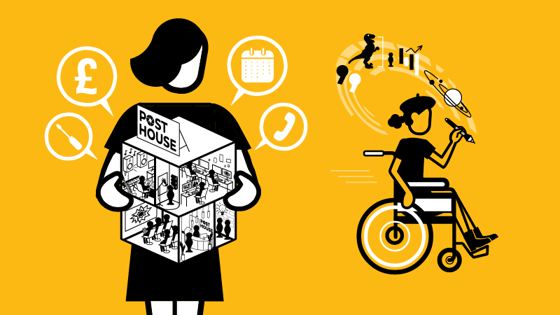Unscripted TV
Studio assistant
Also known as: Studio runner

What does the studio assistant do?
The studio assistant, sometimes known as a runner, supports the studio manager and studio coordinator by taking on many of the day-to-day jobs that come up all the time in a busy studio facility. This could be providing admin support, greeting the cast and crew, printing timesheets or rate cards, answering the phone, ordering taxis, or making sure there is enough tea and coffee and ordering the lunch for meetings.
Being a studio assistant is the perfect opportunity to see how a studio operation runs and to learn the pace and rhythm of programme production. For example, studio assistants quickly become aware of how many days it takes to build a studio set, or to rehearse and record a sitcom, or how many cameras are needed for a chat show. If a studio assistant is keen to learn, they will soon start to understand how to run a production effectively and how the simplest things can hold up a production and waste valuable time – the main presenter not being able to find their dressing room, for example, or the transport failing to meet them at the agreed time.
If they are good, a studio assistant could go on to become a studio coordinator or perhaps a studio manager, or they might choose to take what they have learnt in the studio facility and move into production management and perhaps, one day, produce their own programmes. If they have the right personality, they will soon become known throughout the whole facility and be a part of the studio’s success. It’s a wonderful place to take your first steps in the world of broadcasting.
What’s a studio assistant good at?
- Being organised: be efficient and sensible in prioritising, choosing the order in which to complete tasks; be able to file and keep things in order
- Learning by watching and asking: observe what’s happening and know when to ask about things you don’t understand
- Paying attention: be attentive to what your colleagues are working on and how to be of service to clients
- Being proactive: study the rhythm and workflow of the studio and be proactive in helping with tasks and preparing for projects; be flexible and ready to sort out a myriad of problems as they arise
- Working as a team: be approachable and useful so as to maintain good working relationships with your colleagues
Who does a studio assistant work with?
A studio assistant is the right hand of the studio coordinator, who works under the studio manager. The crews of the studio productions can at times also ask for help with various tasks.
How do I become a studio assistant?
The studio assistant job is an entry-level role. To get started, find a studio and approach the manager about possible work. It is important to demonstrate certain traits and attributes to a potential employer that show your ability to deal with the tasks involved. Focus on showing initiative, an ability to prioritise and an attitude of being ready to help with whatever may arise. Having a driving licence and good experience of moving and transporting things is sometimes expected.
At school or college:
If you want to go to university, A-levels or Highers in film studies, media or art and design are relevant. As it is a role that combines understanding film production with project management and accounting, subjects that develop your skills in that way are useful too. Combine film studies with business or business studies and maths for a well-rounded skill set. Or you might want to take the following Level 3 vocational qualifications:
- OCR Technical Diploma/Extended Diploma in Business
- BTEC National Diploma/Extended Diploma in Business
- BTEC National Diploma/Extended Diploma in Enterprise and Entrepreneurship
If you want to go straight into a job or apprenticeship, the following Level 3 vocational qualifications will equip you:
- AQA Foundation Technical Level Business: Marketing Communications
- AQA Technical Level Business: Marketing
- NCFE Diploma in Skills for Business: Sales and Marketing
Get an apprenticeship:
Apprenticeships are jobs with training, so they are a good opportunity to earn as you learn. Check out the websites of film and TV studios. The British Film Commission has a list of UK studios. See what apprenticeships they offer. This will get you into the studio and you can find your way into studio management from there. Alternatively, you might be interested in finding out more about the industry by getting an apprenticeship with a broadcaster. These won’t be in studio management as such, but an apprenticeship in production management or as a live event technician could set you up well for transfer into a studio at a later point. Alternatively, you could take an apprenticeship in business or marketing outside the industry, become an expert in that area and then move into a film or TV studio. To find out more, go to what’s an apprenticeship?. Go to where can I find an apprenticeship? to learn how to find apprenticeships in your region, or approach companies directly. Take a look at our list of apprenticeships to find the schemes of the main broadcasters.
Get a degree:
You don’t need a degree to get into this role, but if you’re interested in having one, take one you enjoy. You might want to look at ScreenSkills’ list of recommended courses and select one in film and television production. We recognise courses with our ScreenSkills Select award where they offer training in the relevant software, dedicated time to building a portfolio and have strong links with the unscripted TV industry. Courses in accounting, business or finance may also be helpful.
Get work experience:
Try to get work experience by writing to film and TV studios. Alternatively, try to get work experience with broadcasters such the BBC, ITV, Channel 4, Sky and the PACT Indie Diversity Training Scheme It’s also worth contacting production companies to see if they offer any.
Look outside the industry:
Get experience in event management and coordination of venues. A strong transferable skill set is having experience managing different projects at a fixed location and gaining the skills to communicate and sell that service. Volunteer at festivals to help coordinate the setup of stages and sound equipment. Other work experience that gives you a proven track record in sales in a related industry, such as hotels, conferences and IT, is useful.
Network in person:
Get to know people in the unscripted TV industry by attending events, such as ScreenSkills’ Open Doors. Go to training and opportunities and use the events filter to find out what’s on. Meet professionals and ask them questions about their work, while demonstrating interest in and knowledge of the industry. Offer to provide them with your professional contact details and try to stay in touch with them. Go to network well to learn how to do this.
Network online:
Create a LinkedIn profile. See if there are Facebook pages or other social media groups for people making unscripted TV in your area. There might even be groups for runners and trainees. Join them. Create a ScreenSkills profile. There are a lot of crewing agencies that will charge you to be on their books. Sign up to the free ones initially. Wales Screen, Northern Ireland Screen and other areas offer free crew databases. Find a film office near you and get connected. If you do sign up to paid websites, make sure they specialise in the areas in which you’re interested.
Search for jobs:
Research film and TV studios that you’d like to work for. Regularly check their websites and job listings websites to see if they are advertising for roles. Make use of the ScreenSkills jobs board. You can also send in a short speculative letter with your CV to the studio. StartinTV offers tips on creating your CV and attending interviews, as well as some advice for your first day working in TV.
You might also be interested in...
Alternatively, you could consider being a receptionist or runner in the unscripted TV industry.
Further resources
- British Film Commission list of UK studios
- Engineering Council
- BBC Academy
- ITV Entry Careers
- Sky early careers
- 4Talent (Channel 4)
- StartinTV
- BAFTA Guru
- IMDb
- Royal Television Society
- Bectu (the media and entertainment union)
- Bectu Ratecards
- Women in Film & Television UK
- Screen Daily
- ScreenSkills resources directory







